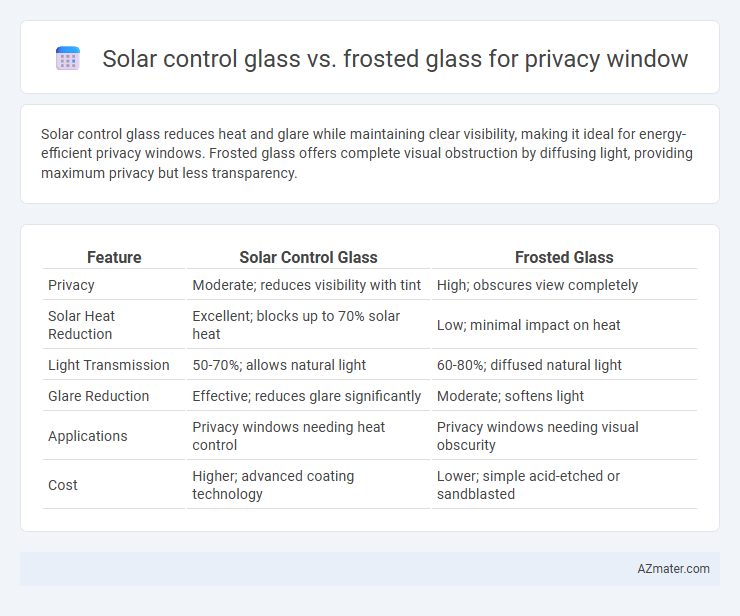Solar control glass reduces heat and glare while maintaining clear visibility, making it ideal for energy-efficient privacy windows. Frosted glass offers complete visual obstruction by diffusing light, providing maximum privacy but less transparency.
Table of Comparison
| Feature | Solar Control Glass | Frosted Glass |
|---|---|---|
| Privacy | Moderate; reduces visibility with tint | High; obscures view completely |
| Solar Heat Reduction | Excellent; blocks up to 70% solar heat | Low; minimal impact on heat |
| Light Transmission | 50-70%; allows natural light | 60-80%; diffused natural light |
| Glare Reduction | Effective; reduces glare significantly | Moderate; softens light |
| Applications | Privacy windows needing heat control | Privacy windows needing visual obscurity |
| Cost | Higher; advanced coating technology | Lower; simple acid-etched or sandblasted |
Introduction to Privacy Window Solutions
Solar control glass enhances privacy by reducing glare and controlling solar heat while maintaining clear visibility, making it ideal for energy-efficient window applications. Frosted glass provides a higher level of privacy through its opaque surface, diffusing light and obscuring views without sacrificing natural light. Both solutions address privacy needs but differ in aesthetics and functionality based on user preference and environmental conditions.
Overview of Solar Control Glass
Solar control glass is specially designed to reduce heat gain and block harmful UV rays while maintaining natural light, making it highly effective for privacy windows without compromising brightness. It incorporates coatings or films that reflect infrared radiation, which helps in indoor temperature regulation and energy efficiency. Compared to frosted glass, solar control glass offers superior glare reduction and UV protection, enhancing comfort and privacy in residential and commercial spaces.
Overview of Frosted Glass
Frosted glass offers enhanced privacy by diffusing light while obscuring visibility, making it ideal for bathroom windows, office partitions, and conference rooms. Unlike solar control glass, which primarily reduces heat and UV penetration, frosted glass focuses on maintaining privacy without compromising natural light transmission. Its textured or sandblasted surface provides a translucent effect, ensuring privacy while allowing daylight to brighten interior spaces.
Privacy Performance Comparison
Solar control glass offers moderate privacy by reducing glare and limiting visibility from the outside while maintaining clear views from within, making it suitable for environments where daylight and privacy are both priorities. Frosted glass provides superior privacy performance by obscuring visibility entirely, preventing clear sightlines while still allowing natural light to diffuse through, ideal for bathrooms or private office spaces. When prioritizing privacy, frosted glass outperforms solar control glass, which is more focused on thermal and glare control alongside partial privacy benefits.
Light Transmission and Visibility
Solar control glass reduces light transmission by filtering infrared rays while maintaining clear visibility, making it ideal for privacy windows that require natural light without excessive glare. Frosted glass diffuses light to significantly lower visibility through the window, enhancing privacy but reducing clarity and overall brightness in the room. Choosing between the two depends on whether prioritizing transparency with sun protection (solar control glass) or maximizing obscured visibility and diffuse lighting (frosted glass) for privacy needs.
Energy Efficiency and Heat Control
Solar control glass significantly reduces solar heat gain by reflecting and absorbing infrared radiation, enhancing energy efficiency and maintaining cooler indoor temperatures. Frosted glass provides privacy by diffusing light but lacks thermal insulation, leading to higher energy consumption for cooling. Choosing solar control glass optimizes heat control and minimizes reliance on air conditioning, making it a superior option for energy-efficient privacy windows.
Aesthetic and Design Options
Solar control glass offers sleek, modern aesthetics with subtle tinting that enhances building exteriors while providing effective glare reduction and UV protection. Frosted glass provides a distinctive, opaque finish ideal for creating elegant privacy with versatile patterns and textures that add artistic flair to interior and exterior designs. Both options cater to sophisticated design preferences, with solar control glass emphasizing transparency and energy efficiency, and frosted glass focusing on diffuse light and decorative versatility.
Maintenance and Durability
Solar control glass offers superior durability with its specialized coatings that resist scratches and reduce fading, minimizing maintenance frequency compared to frosted glass. Frosted glass, while effectively obscuring vision, tends to show smudges and dirt more prominently, requiring regular cleaning to maintain its aesthetic appeal. The enhanced resistance of solar control glass to environmental wear ensures longer-lasting privacy without compromising performance.
Cost and Installation Factors
Solar control glass typically costs more upfront than frosted glass due to advanced coatings that reduce heat and UV radiation, enhancing energy efficiency. Installation of solar control glass requires professional handling to maintain the integrity of the coatings, whereas frosted glass, either chemically etched or film-applied, offers simpler and more cost-effective installation options. While frosted glass provides effective privacy, solar control glass combines privacy with thermal performance, potentially lowering long-term cooling expenses despite higher initial investment.
Choosing the Right Glass for Your Needs
Solar control glass reduces heat and glare through reflective coatings, making it ideal for energy-efficient privacy windows in sunny climates. Frosted glass offers consistent privacy by diffusing light and obscuring vision while allowing natural light to pass through, suitable for bathrooms or offices. Selecting the right glass depends on whether heat reduction or maximum visual privacy is your priority.

Infographic: Solar control glass vs Frosted glass for Privacy window
 azmater.com
azmater.com